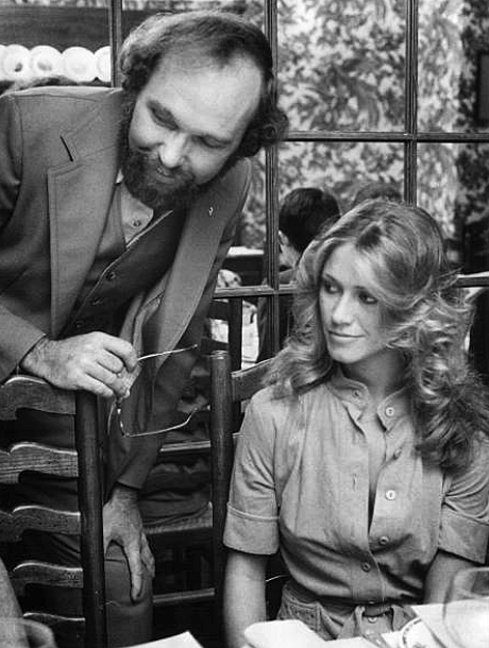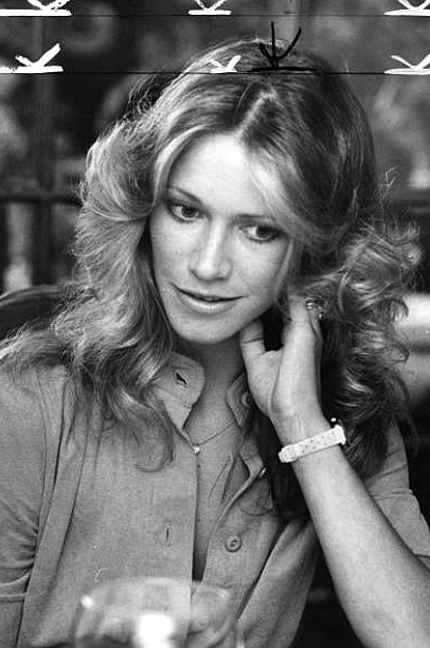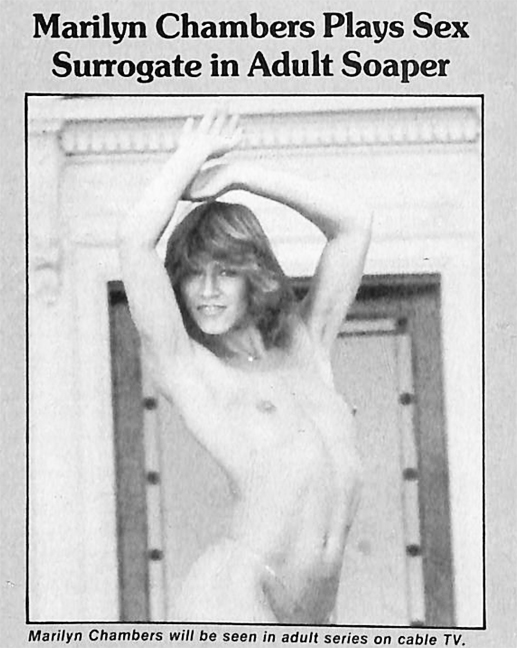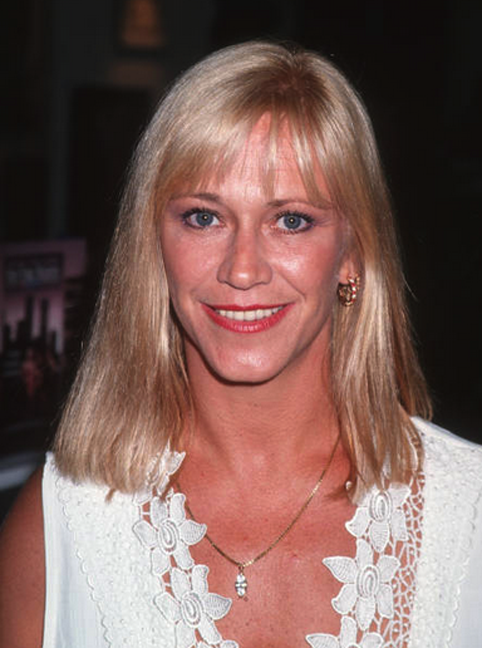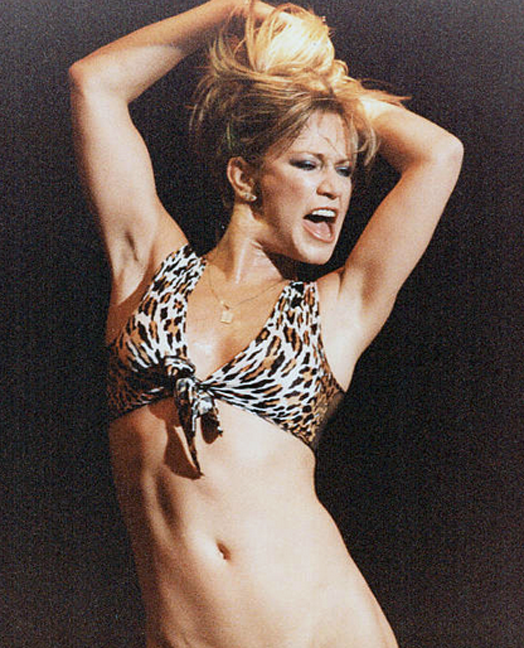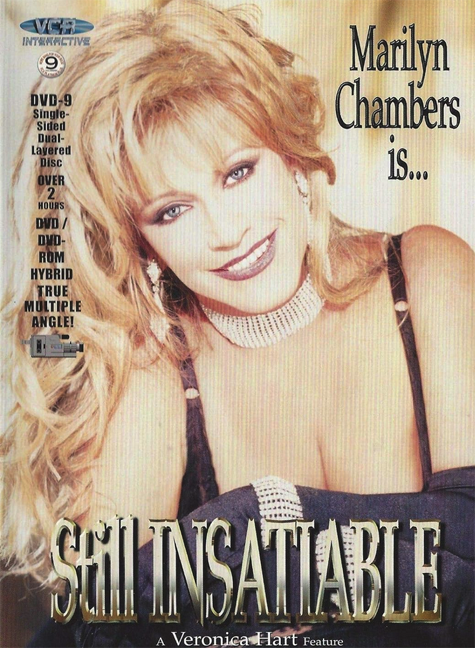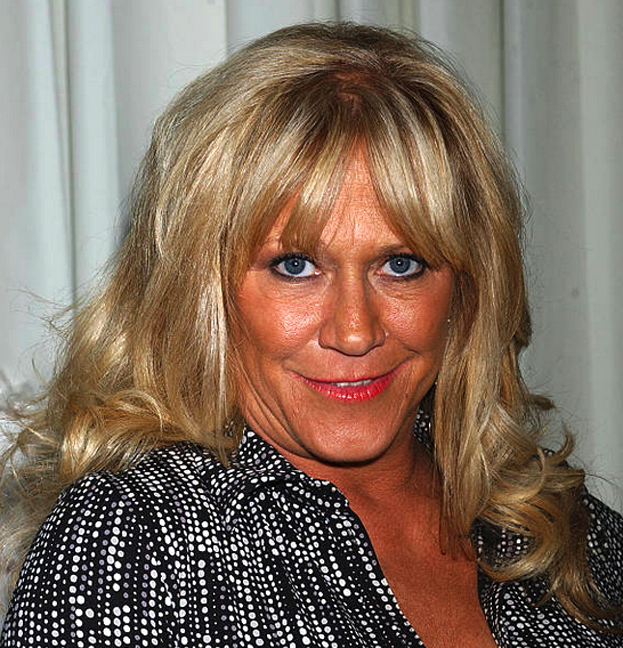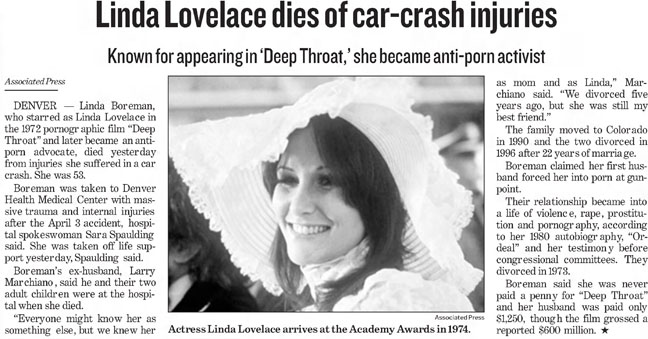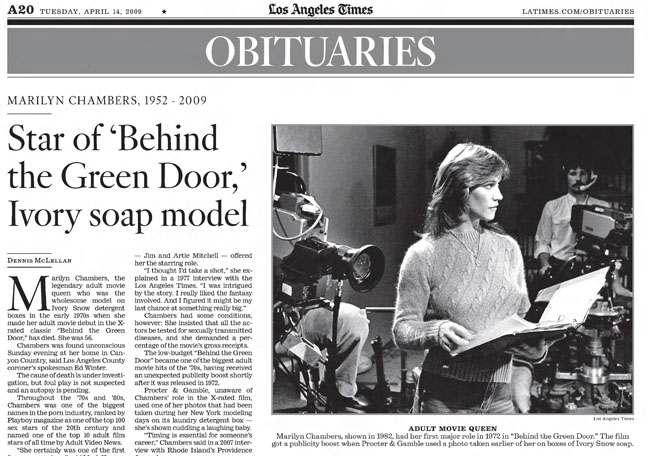
This episode currently has no reviews.
Submit Review- Podcast |
- The Rialto Report
- Publisher |
- Ashley West
- Media Type |
- audio
- Publication Date |
- Mar 17, 2024
- Episode Duration |
- 01:00:42
David Cronenberg's 'Rabid', Linda Lovelace and Marilyn Chambers, the Nicaraguan Contra rebels and more..
The post Svengali – The Chuck Traynor Story: Part 7, Endgame, Podcast 137 appeared first on The Rialto Report.
On the previous episode of Svengali – The Chuck Traynor Story:
On the heels of a very public divorce, Chuck Traynor and Linda Lovelace were finally separated and began to forge their own paths. Chuck wasted no time partnering with up-and-coming adult star Marilyn Chambers, becoming both her manager and her husband. Linda combined a professional and romantic relationship with producer and choreographer David Winters, combing the U.S. and U.K. for financial opportunities.
But while Linda’s relationship with Winters fizzled after a couple of years, Chuck and Marilyn continued strongly. Together they booked everything from Vegas stage shows and mainstream plays to spreads in men’s magazines and adult film roles.
Then, in the early 1980s, Linda dropped a bombshell. She released a new autobiography titled ‘Ordeal’ that went into graphic detail about her abuse at Chuck Traynor’s hands. It was a bestseller, and its success brought Linda into contact with Women Against Pornography, a feminist group determined to take down the adult industry. The book’s popularity also led to yet another autobiography, ‘Out of Bondage’, which went even further in criticizing both Chuck and the porn industry.
How did this negative publicity affect Chuck – and his new partner Marilyn Chambers? Apparently, not one bit. In fact, the general public reacted by criticizing Linda Lovelace, and the couple seemed tighter than ever. But were they as happy as they made out to be – or was it just a matter of time before Marilyn, like Linda, would change her tune and turn on Chuck?
On this final, wild episode of ‘Svengali’… we hear about David Cronenberg’s ‘Rabid’, Linda Lovelace providing testimony for the U.S. government, the infamous Survival Gun Store in Las Vegas – the largest seller of machine guns on the west coast, Chuck leaving Marilyn for an underage stripper, how Chuck became involved with the Nicaraguan Contra rebels, drug and alcohol addiction, Marilyn’s arrest and comeback at the age of 50, and much more…
Welcome to the final episode in our series ‘Svengali – The Chuck Traynor Story’.
Marilyn-Chambers-04.png">Marilyn-Chambers-04.png" alt="Marilyn Chambers" width="529" height="648">
This episode running time is 61 minutes.
—————————————————————————————————————————————————–
1. Chuck and Marilyn
In the mid-to-late 1970s, Chuck and Marilyn were splitting their time between their ranch just outside Las Vegas and Los Angeles, as well as traveling the country so that Marilyn could work the club circuit and do promotional spots.
Then, in 1976, Chuck and Marilyn got offered a taste of what they’d been looking for. They were contacted by film director David Cronenberg who was casting the lead role in his new horror film, Rabid (1977). Producer Ivan Reitman suggested Marilyn, as Cronenberg was a relatively new director and Marilyn’s fame could be helpful to the project. To be fair, Cronenberg’s first choice to play the role was Sissy Spacek, but Reitman convinced Cronenberg to choose Marilyn arguing they needed someone with more sex appeal.
Here’s how Cronenberg remembered Marilyn:
“When I met her, she was a lot harder than I’d hoped. She had plucked eyebrows and her hair was very pre-Farrah Fawcett. She’d been doing shows in Las Vegas. Chuck Traynor, her husband/manager, was not my favorite kind of guy. Very tough. They were both into trading gold-plated revolvers with Sammy Davis Jr., that kind of thing. It’s a world totally foreign to me; not one I’ll ever get to know too well.
“But Chuck was very protective of Marilyn, and very supportive of the movie as well. As for Marilyn herself, she was very shrewd and sharp, and worked really hard. She’d obviously had some rough times since that first little movie that I saw of hers, Behind the Green Door (1972). But she was a real trouper, and invented her own version of method acting. When she had to cry, for example, it wasn’t a problem, because Chuck would say, “Remember when Fluffy died” – Fluffy was her cat – and then she’d cry. I thought she had real talent.”
Rabid-02.jpg">Rabid-02.jpg" alt="Rabid" width="648" height="510">
When ‘Rabid’ came out, it met with mixed reviews, Variety saying that it was “an extremely violent, sometimes nauseating, picture”. Commercially however, it was a big hit. It grossed $100,000 in the first ten days after opening in Montreal, and became one of the highest-grossing Canadian films of all time, making $1 million in Canada alone.
Cronenberg was pleased with Marilyn’s contribution. He said, “I expected her to go on and do other straight movies, but after ‘Rabid’ I think she went back to adult films. I don’t know if it was Chuck, or that the mainstream industry still wouldn’t accept her, but that’s what happened. And it was a shame.”
Rabid-01.jpg">Rabid-01.jpg" alt="Rabid" width="497" height="648">
Cronenberg was right: Marilyn’s profile increased dramatically after ‘Rabid’ was in cinemas, but before long she was back on the adult circuit. The good thing was that it was a steady stream of easy income for not doing much. The problem with it was that it wasn’t helpful for Chuck’s long-term vision. Nevertheless, Marilyn liked meeting her fans and soaking up their adoration.
Here’s Marilyn’s close friend Peggy describing Marilyn’s mindset when she doubled back down and re-emerged in the adult industry:
“Everybody loved you. Crowds lined up around the block to see you, talk to you, be near you. She loved it. Chuck loved it because he was like, “Look what I made. I made this.””
1.jpg">1.jpg" alt="Chuck Traynor" width="506" height="648">Marilyn and Chuck
Chuck and Marilyn’s relationship seemed to work for them, but it wasn’t a typical husband-wife partnership, so let’s take a moment to dig deeper. To start with, Chuck was controlling with Marilyn just as he had been with Linda. Marilyn herself described the dynamic, saying:
“I had a dominant-submissive relationship with Chuck. He was definitely the stronger one. I relied on him for everything.”
But there was a key difference between Marilyn and Linda, in that Marilyn seemed to willingly submit to Chuck’s control, even actively seeking it out. And that didn’t necessarily mean that there was an imbalance of power. In fact, as Marilyn’s friend Peggy describes, Marilyn was always the one keen to set the boundaries:
“You say he dictated and made her suck dick and made her do this and this and this. Untrue. Marilyn never did anything she didn’t want to. I don’t think anyone ever was responsible for Marilyn other than Marilyn.”
1.jpg">1.jpg" alt="Marilyn Chambers" width="414" height="648">
Adult film director and performer Jane Hamilton, another friend of Marilyn’s, echoed Peggy’s point of view:
“Marilyn was never a victim. She was nobody’s victim for anything. He was good for her. And like I said, I think she attributed a lot of her success to Chuck. She was smart. And he must have done a lot of great things for her or she still wouldn’t have him as a friend. Marilyn wouldn’t do that.”
Marilyn herself agreed:
“A man that I really can fall in love with is somebody who is very sure of himself, has a good sense of humor, definitely has to, but is also the more dominant one. I like to be the woman, and I like to be, you know… I like a guy to take care of me. And he has to feel secure with himself and in his career.
“Well, I mean, I’ve been with Chuck for what, 10, 11, whatever is years, and he’s a… I hate to ruin his reputation, but he was one of the nicest guys I’ve ever met. [chuckle] And he’s a very good manager because it’s… You know, in any business, I mean, as any realm of show business, you have to be able to take criticism as an entertainer, and that’s not always easy, it’s not always pleasant, but it’s a fact. And in order to become a better person, not just as an entertainer…I felt he’s made me become a better person in general.
“You know, we set goals for me to become a better person… When I met him, I was an ex-hippie from San Francisco. [chuckle] And I think that he kind of made me a little bit more polished and certainly taught me a lot as far as dealing with people.
“I never felt exploited by Chuck or anybody else. I exploited me.”
So why would a strong, capable woman like Marilyn sign up for what she herself described as “an Eliza Doolittle thing”? Her friend Peggy thinks there was a moral dimension to it for Marilyn:
“Marilyn needed somebody to check her. She always was looking for a moral compass. I mean Marilyn was self-doubting a lot. But she was such an astute businesswoman. I mean financially she really was so good. She was the good girl. Persona or not, she was that person.”
Jane Hamilton confirms Peggy’s point of view:
“She liked to be dominated. She needed to be made to do it, because she always wanted to be the good girl. God she was as dirty as they come. But she never wanted to have the responsibility of being the bad girl.
“This is not my fantasy but it’s a common fantasy of women: to be taken, to be had, to be made to. They’re good girls and they were made to do it. Cause it relieves the responsibility of choosing sex. So how do you portray that in a positive light that doesn’t send out a message that women want to get raped?
“That’s the relationship that worked for Marilyn – but didn’t work for Linda.”
It did work for Marilyn – and for Chuck – for quite a while. For years, the two were inseparable. But they lived in a world that could be difficult for a regular couple, and by the late 1970s, cracks were beginning to form in their relationship. Marilyn was sharp and extremely capable, but she also demanded a lot of attention. Her friends believe this was fueled by insecurities that bubbled just below the surface. No matter how famous and adored Marilyn was, there was part of her that made her never feel good enough.
And Marilyn’s needs continued to grow just as Chuck was beginning to explore entirely new avenues of his own. In the mid 1970s, the survivalist movement emerged with force. It was driven by a fundamental fear of Communism, fueled by the Cold War, and amplified by the prospect of nuclear annihilation. Publications like Soldier of Fortune magazine glorified the military, guns, and survival gear. And as a self-described Florida hick with a love of firearms and country, Chuck wanted in. He loved the macho, alpha male, kick-ass bravado of the new right. And he felt Vegas was the perfect place to build his long-term dream of opening a gun store.
But first, Chuck was looking for another business opportunity. Another sex-oriented starlet opportunity. With Marilyn’s blessing, Chuck was on the lookout for a new, young, aspiring performer who he could mold into another sex symbol using his well-honed managerial skills. Sure enough, in 1980, he hit paydirt when he met 17-year-old Bo Bozlee. Just like Linda and Marilyn before her, Bo was pretty and pliable, and she had the figure of a 1950s pin-up model too. Or in Bo’s words:
“When I was 15, I wanted to be a ballet dancer, so I starved myself so I wouldn’t get breasts. When I didn’t want to be a ballet dancer anymore, I forced my breasts to grow, and they did.”
1.jpg">1.jpg" alt="Chuck Traynor" width="416" height="587">Bo
On one of their first dates, Chuck took Bo to the gun range, one of his favorite hangouts. It turned out Bo’s father was also a gun lover who’d started teaching his daughter to shoot when she was just five years old. Of that first day at the range with Chuck, Bo remembered:
“Chuck showed me the Uzi, and two days later, I went to a machine-gun competition and placed. Beat all these guys.”
1.jpg">1.jpg" alt="Chuck Traynor" width="591" height="648">Bo, and friend
At this point, we need to address the fact there was an age gap between the two of them. A big one. Chuck was approaching 45 while Bo was 17, but that didn’t stop the two from getting involved in a sexual relationship soon after they met.
If Chuck was starting to move away from Marilyn, Marilyn too was beginning to feel stymied in their romantic relationship. She told Chuck she was thinking about going back to school part-time for nursing, but his response was a hard no. He argued that Marilyn was still sexy, still in demand, and could still make good money on the sex circuit. He said they should milk it for as long as it lasted. He argued that, while the two of them still loved each other, their marriage had morphed into more of a friendship. This would make things easier, he said: their partnership would now be platonic, professional, and free of sexual jealousy.
DSC00091.jpg">DSC00091.jpg" alt="Chuck Traynor" width="648" height="432">
So when Marilyn met a guy named Bobby D’Apice on a trip back east to see her family and do some performing, she had no reservations going home with him. Bobby was a professional bodyguard, a strapping Italian American, and the type of man’s man that Marilyn was attracted to. Bobby also happened to be the son of Andre D’Apice, a notorious soldier for the Colombo crime family who was third in command at Star Distributors, the east coast’s largest porn dealer. Star controlled a bunch of adult bookstores, movie theaters, and publishing houses. For decades, Star’s biggest customer was Reuben Sturman, aka the ‘Walt Disney of Porn’. But Star Distributors deserves its own Rialto Report story, so let’s get back to Marilyn and Bobby.
Here’s how Bobby remembers getting together with Marilyn:
“I met Marilyn in the late 1970s when she came to New York for a week to do some commercials for a company called Private Screenings. Chuck arranged for me to pick Marilyn up in Connecticut where she was visiting her family and bring her into the city.
“She told me she and Chuck were getting a divorce. When I came into the picture it was like Chuck was glad to have someone else take the burden – let’s put it that way. I think I was his knight in shining armor at that point. And Chuck had already taken up with Bo. And Bo was a baby – she was so young.
“About a month after I first met Marilyn, she got back in touch with me to say she and Chuck wanted to hire me to be her road manager. Chuck had decided to stop going on the road with Marilyn, in part because he’d already started grooming Bo for the business.”
And so started a new phase in Chuck and Marilyn’s relationship. Still close, still business partners, still married – but now both of them living with other people.
DSC00011.jpg">DSC00011.jpg" alt="Chuck Traynor" width="648" height="432">
Here’s how Bobby describes things when Marilyn called him with a job offer from Chambers Traynor Enterprises:
“First, I moved with Marilyn to California so she could do TV spots. I remember one in Sacramento where representatives from Women Against Pornography showed up and asked Marilyn how she could have sex for money. Marilyn calmly said, “If your husband comes home on a Friday night and refuses to give his paycheck over, I bet you wouldn’t sleep with him.” Marilyn put them in their place. Marilyn was sharp. She had a very high IQ and was very intelligent. It was funny.”
While out in California, Marilyn got an acting part in a TV series titled ‘Love Ya Florence Nightingale’ in which she played a sex therapist, helping couples through their troubles.
Pitched for the cable TV market, ‘Love Ya Florence Nightingale’ was a vehicle intended to showcase Marilyn’s legitimate acting chops while at the same time also leveraging her adult notoriety. Marilyn, Chuck and Bobby had high hopes for it, but as with other projects over the years, the show never delivered the cross-over success that Marilyn and Chuck craved. So Marilyn and Bobby packed up and headed back to Vegas.
Based in Nevada, the two couples lived together in an unusual arrangement. Chuck continued coaching Bo, booking her into local strip clubs to build up her performing skills. Bo was a willing student, describing the focus of Chuck’s curriculum:
“It was like etiquette, and how to be perky so people will like me, and how to be the cutest and glamour-est I can, so I can turn on an audience.”
While Chuck tutored Bo, he also continued to arrange all of Marilyn’s gigs. And, as Bobby recalled, Chuck was good at it:
“I worked for Chambers Traynor Enterprises for about ten years, and all that time Marilyn and Chuck were doing business together. Chuck would arrange everything for Marilyn, and Marilyn and I would travel. Chuck was one of the best managers in the industry. He got Marilyn top dollar for all her appearances and points on every video of her that sold.”
The adult business wasn’t the only thing Chuck and Marilyn were involved in. In 1982, they finally decided to invest in Chuck’s dream, a Las Vegas gun shop and shooting range, called The Survival Store. He’d approached a life-long gun enthusiast, named Bob Irwin, with the proposal, offering to not only financially back the venture but to leverage Marilyn’s popularity to promote it. The combination worked – it didn’t take long for The Survival Store to boast that it had sold the most machine guns west of the Mississippi.
1.jpg">1.jpg" alt="Chuck Traynor" width="648" height="481">Chuck & Marilyn
Bob Irwin and Chuck were two very different people. Bob, for example, was more of a law-and-order traditionalist, conservative to his core, and with a strong idea of right versus wrong. Of the partnership, Bob jokingly said:
“Christmas parties were interesting. Chuck’s friends were bikers, porn queens, and mob people. Mine were mostly cops.”
But Bob and Chuck became friends as well as business associates. And for years until his passing in 2021, Bob had nothing but good things to say about Chuck and Marilyn. Bob confirmed that long after Chuck and Marilyn separated romantically, they continued to stay close friends, often meeting in the store. Marilyn’s boyfriend Bobby worked at the store too when he wasn’t on the road with Marilyn. And, like Marilyn, Bo promoted the business too – and took it farther than perhaps even Chuck could ever have anticipated.
Bo’s marketing activities began as might be expected. She was photographed seductively clutching automatic weapons for local advertising. She became a regular at Soldier of Fortune magazine’s annual conventions, where attendees wore t-shirts with slogans like ‘Nuke Jane Fonda’, ‘Eat Lead, You Lousy Red’, and ‘Kill a Commie for Mommy’. But then, somehow, Bo found that she had become the official pinup girl for the Contras, the right-wing rebel group that fought against the government in Nicaragua.
1.jpg">1.jpg" alt="Chuck Traynor" width="447" height="648">Bo – and The Survival Store
Let’s take a step back to explain. Since 1979, the Nicaraguan government had been run by a Marxist group that emerged from a guerrilla organization, the Sandinista National Liberation Front. When Ronald Reagan became U.S. president in 1981, he perceived the Sandinistas to be a threat to American values, so he started financial and military backing of the Contras, who were anti-Sandinista guerillas.
In 1983, some of the Contras showed up at the Soldier of Fortune convention in Vegas, and they introduced themselves to Bo, asking for autographs on her pin-up posters that they could share with their commandantes back home, Chuck was pleased with the attention from these righteous freedom fighters. Fiercely anti-communist and pro-capitalist, he also sensed an opportunity – which he positioned as patriotic self-sufficiency of course:
“Bo really believes in the anti-communist movement. She’s not just a pretty girl on a poster. She’s been trained as a parachutist, a scuba diver. She’s certified by the NRA as a weapons instructor, and is quite competent with a wide range of sophisticated automatic weapons.
1.jpg">1.jpg" alt="Chuck Traynor" width="648" height="594">
Bo leaned into the opportunity, proudly stating:
“I was thinking while I was making the last poster, what if this poster could brighten the day of the men fighting this crucial war? Let me make this a great one – for the Contras.”
And so it came to pass that Bo’s face, and her gun-toting posters, spread like wildfire across the south American country, and she became the face of freedom all over Nicaragua for the rest of the decade.
As Chuck stated proudly: “If the contras ever take power in Nicaragua, Bo will be their first lady.”
1.jpg">1.jpg" alt="Chuck Traynor" width="454" height="648">Bo – and The Survival Store
DSC00009.jpg">DSC00009.jpg" alt="Chuck Traynor" width="452" height="648">
While Chuck and Bo were reaching for new heights, Marilyn was experiencing some lows. She was aging out of the sex industry that had made her a star, and that didn’t feel good. Then there was her ex-husband Chuck clearly more interested in his new underage obsession. Marilyn had always had a weakness for drugs and alcohol, but while she and Chuck were living together, Chuck had kept Marilyn on the straight and narrow – or at least the pretty straight and the pretty narrow. But once Marilyn and Chuck split romantically, she began to party in earnest. As boyfriend Bobby remembered:
“When Marilyn and I became a couple, alcohol, and drugs went together with everything we did. It was make love, not war… mixed in with sex, drugs, and rock and roll.”
During this period, cocaine became Marilyn’s most reliable and constant companion, and a number of those around her felt it darkened her normally playful personality. One of those was adult film actress Juliet Anderson, also known as Aunt Peg. By the end of 1983, Aunt Peg was ready to make her last adult film and so she signed on to co-star with Marilyn Chambers. The film was Insatiable 2 (1984) and Marilyn was set to reprise her role from the first installment, playing an heiress seeking sexual fulfillment. It was meant to be Aunt Peg’s swan song, a heartfelt goodbye to an industry that she loved. But that wasn’t quite how it turned out. Here’s how she remembered the episode:
“That last movie, ‘Insatiable 2’, with Marilyn Chambers, was one of the most disappointing experiences I ever had. I thought it would be a nice final film experience to be able to finally make a film with Marilyn Chambers.
“So I’m really looking forward to it, and I was sitting alone getting my hair and make-up done, and she comes in with an entourage which consisted of her lover, her make-up artist, and her gopher assistant. She walks in like a queen, with this holier-than-thou look on her face. I said, “Oh, Marilyn, hi, I’m Juliet. I’m in the movie with you.” She barely hesitated and walked out the room. That was it!
“I was just stunned, and the make-up artist, David, said to me: ‘Don’t pay any attention, she gets in these moods sometimes. That’s just the way she is, she can be a real prima donna. She brings all her entourage with her because they make her feel like she’s really important.
“I was devastated. And then to make matters worse, she had insisted that her current lover be the leading man. He’d never been in a film before – which was completely against the way things were done. But she wouldn’t make the movie unless this man could star with her. However, and I give her credit for this, she was still a fine actress.”
Marilyn’s current lover whom Aunt Peg refers to was, of course, Bobby D’Apice, credited in the film as Bobby Dee. By this point, not only was Marilyn’s relationship with Bobby infused with drugs and alcohol, it was also steeped in emotional and physical abuse. It felt as if Marilyn was fighting everyone around her, and sure enough, in 1985, Marilyn asked Chuck for a divorce.
There are lots of stories that say Marilyn and Chuck’s split was contentious and acrimonious. But her close friends say Marilyn never saw it that way. Like the kids say nowadays, it’s complicated.
Close friend Peggy remembers:
“The love of her life was never Chuck. It was never Chuck. She left Chuck – it wasn’t the other way around. She was glad to move on.
“Marilyn and Chuck had a history. They had a history. And it was so good. It was the highest of highs. The best time of her life was with that man. The way they were treated. The boundaries they stomped on. Boy wasn’t that the funniest time. You just want to hold on to it. It’s like the baseball player that hits a grand slam in the World Series.
“People will rarely remember what you said but they will definitely remember how you made them feel. And 90% of the time Chuck made her feel like she was a queen.
“Did he knock some doors down? Sure. Was he her Svengali? Probably. Chuck and her were on the same wavelength. We’re doing this for the outcome of this. You know what I mean? That’s why their divorce wasn’t nasty.”
DSC00139.jpg">DSC00139.jpg" alt="Chuck Traynor" width="648" height="432">
In May 1985, Chuck and Marilyn’s divorce became official. But their business partnership continued, as evidenced by one of the biggest events in Marilyn’s professional life, her return to the Mitchell Brothers’ O’Farrell Theater where she’d started her adult career over a decade earlier. It was a gig Chuck orchestrated, and Marilyn remembered it like this:
“I felt I still had to fulfill my reputation when I came back to the O’Farrell. I wanted to be the best. Chuck always told me, “You’ve got to give the audience what they don’t expect.” He said, “Tina Turner starts wild and ends wilder. That’s what you’ve got to do.” That was some of the best advice I ever got. I always wanted people to go out of a show saying, “My God! Did you see what she did? I can’t believe it!””
Marilyn’s performance was no longer just a simple burlesque strip show. Now she prided herself with how far she could push herself. As she remembered:
“It was a question of showing them how much I could take. I showed them that I could take a fist up my butt and have hot candle wax dripped all over me. People would go, “Oh my God! That’s amazing! How could you do that?” I loved people telling me that I was amazing.” Onstage, being ‘the best’ meant putting on a show that had been choreographed by Chuck Traynor.
Billed as ‘Feel the Magic,’ the O’Farrell program touted Marilyn as “a touchable fantasy.” Chuck ensured the Mitchell Brothers fully promoted her run to draw the biggest audience possible – and it did. The trouble was that alerted the authorities as well: Dianne Feinstein, today thought of as an avid supporter of liberal causes like abortion rights and gun control, was then San Francisco’s mayor and well known for campaigns against adult entertainment. Mayor Feinstein had police officers arrest Marilyn right in the middle of her performance, and Marilyn was taken naked from the theater, and booked on charges of soliciting sex for money. Marilyn responded with the following statement to a local television news reporter:
“I’ve never been arrested in my life for anything, ever, so this is kind of a big shock for me, not only as a performer but as a human being.”
Marilyn ended her statement by turning to the camera and addressing her mother, saying, “Mom, I’m not a prostitute.” She then turned back to the TV reporter to qualify her statement, explaining: “My mom has only just got over the X-rated films.”
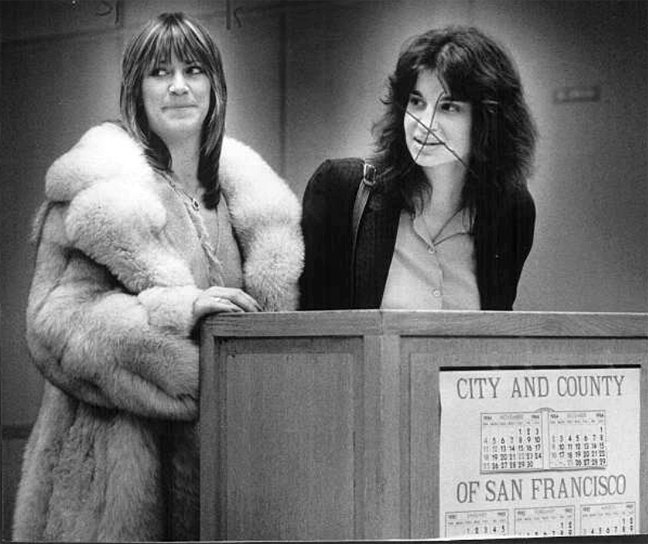 Marilyn makes a statement after her arrest
Marilyn makes a statement after her arrest
The city prosecutor ultimately dropped the charges against Marilyn, citing lack of evidence of any crime. In vindication, the Mitchell brothers posted Mayor Feinstein’s unlisted phone number on the O’Farrell’s marquee along with the invitation “For a good time, call Dianne.”
The arrest. The drug-induced lows. The explosive fights with Bobby. Marilyn was approaching her mid 30s and running on empty. Realizing her lifestyle wasn’t sustainable, Marilyn decided to cut things off from Bobby and checked herself into rehab. She needed to clear her head – and her veins – and get her life in order. She canceled all appearances and started to take care of herself. Chuck was reasonably supportive: it may have been money leaving the bank account but he could see that Marilyn was in a bad way, and she was only headed for worse if she didn’t do something about it.
While in rehab, Marilyn met Bill Taylor, a freight-trucking salesman trying to kick a heroin habit. The two hit it off and fell for each other. Not that it was plain-sailing: Bill was wary. He was well down the road to recovery while Marilyn was still in the early stages, and he worried that she might jeopardize his sobriety – so he took a step back. But Marilyn stuck it out, continuing with Narcotics Anonymous meetings after she got out of rehab, and eventually the two became a couple. After that, events moved fast: within months, they were talking marriage – and about Marilyn retiring from the adult business so they could start a family.
While Marilyn was considering stepping away from the adult stage, Chuck’s other ex – Linda Lovelace, now Linda Marchiano – was getting ready to give her final grand performance. Feminist Catharine MacKinnon had arranged for Linda to present testimony at the 1986 Attorney General’s Commission on Pornography. Established by President Ronald Reagan, the Commission’s stated objective was to “determine the nature, extent, and impact on society of pornography in the United States, and to make specific recommendations to the Attorney General concerning more effective ways in which the spread of pornography could be contained, consistent with constitutional guarantees.” In truth, the commission was a partisan, rigged, set-up job. It was far from an impartial study – anyone could see that by noticing that Meese had appointed many well-known anti-pornography crusaders to the panel.
As for Linda, she used her appearance at the hearings less to campaign against pornography and more to reinforce her story of Chuck Traynor, her abuser. She testified:
“My name today is Linda Marciano. Linda Lovelace was the name I bore during a two-and-a-half-year period of imprisonment. For those of you who don’t know the name, Linda Lovelace was the victim of this so-called victimless crime. Used and abused by Mr. Chuck Traynor, her captor, she was forced through physical, mental, and sexual abuse, often at gunpoint and with threats on her life, to be involved with pornography.
“I literally became a prisoner. I was not allowed out of his sight, not even to use the bathroom. At night, what he would do is put his body over my body so that if I did try to get up, he would wake up. And he was a very light sleeper. If I did attempt to move or roll over in my sleep, he would awaken.
“I have no rights as a victim. The only right I have is to be able to tell my story and hope that someone listens.”
Away from the public spotlight, Linda’s health was suffering. She had an acute case of hepatitis – the result of a drug transfusion after the car crash back in the 1960s that led her to meet Chuck. She was awaiting a liver transplant and still struggling financially – two facts that kept her looking to capitalize monetarily on any notoriety she retained.
She was also suffering from depression which led her to alcohol addiction. It was a dependency feminist Andrea Dworkin diagnosed as a response to the post-traumatic stress disorder that Linda carried from her time with Chuck. To make matters worse, Linda’s husband Larry was also an alcoholic by this point. Larry began attending AA meetings and was able to quit, but though Linda gave AA a try as well, she was less successful at fighting the battle against addiction.
While both Linda and Marilyn were struggling, Chuck was thriving. The Survival Store gun and gear sales remained strong, boosted by regular appearances from a group of scantily clad women known as the “Traynettes” in tribute to their manager. As for Bo, Chuck’s latest protege and romantic partner, she continued to gain popularity on the stripping circuit, thanks in part to a manipulative promotional tactic Chuck came up with.
DSC00350.jpg">DSC00350.jpg" alt="Chuck Traynor" width="648" height="423">
Chuck realized that Marilyn wanted to step back from the limelight, so he came up with the concept of an adult changing of the guard. He asked Marilyn to perform in a series of strip shows with Bo to help position Bo as the next Marilyn Chambers.
Recently married and newly sober, Marilyn was rather hesitant. She said:
“I used to love the order of going on the road, of doing each show at a certain time. But now, that’s an intrusion into my order as a housewife. Cooking and vacuuming are a joy to me for the first time. I love taking care of my husband. It’s more fun to make real love to one man than the fantasy of making love to 500. That’s all I want from Chuck, his blessing. I want to show him I can make the transition from pleasing all those men to just pleasing one man. Maybe that’s why I always need a man to take care of me. To be Daddy’s girl. That’s the way it was for me with Chuck, and that’s why I need his blessing now with my new husband.
But Chuck wasn’t put off by Marilyn’s lack of enthusiasm. He knew Marilyn, and he knew three things were still true: Marilyn loved the adulation, she appreciated the money, and she never wanted to let Chuck down. He was right of course, and eventually Marilyn relented, so she hit the road with Chuck and Bo, who was billed as “the next Marilyn Chambers.” The tour was popular, but there was no doubt who the men were coming out to see. They liked Bo alright, but they absolutely adored Marilyn. Sure, she was older and a bit heavier than the early days, but she still put on a great show for audiences nostalgic for one of the legendary adult film performers of the golden era. In truth however, it was a pretty cruel gimmick for Marilyn. She was effectively being marketed as a ‘has-been’ in order to promote the career of her ex’s new lover. It wasn’t a great way to bow out.
1.jpg">1.jpg" alt="Marilyn Chambers" width="503" height="648">Chuck and Marilyn
While Bo may not have been Marilyn, she was devoted to Chuck, and in 1986 she became his wife – Chuck’s sixth, in case you lost count. Why did the two marry? Well, Bo admitted she liked having a father figure. But what was the appeal in another marriage for Chuck? Here’s what Marilyn thought:
“Chuck has lived out most of his fantasies, but he still doesn’t know what’ll make him happy. Bo seems to have helped him there. He’s lost that angry edge he always had. I just hope she doesn’t hurt him. He says she’s his slave, but he dotes on her. It’s cute the way he fixes the bow in her hair. He sews all her costumes himself, by hand.
“I think he’s more interested in holding on to her than making her a star now. That’s why he’s on the road again. To keep her happy. She’s not inclined to be barefoot and pregnant. He needs to keep her needing him without her becoming famous. I just hope he hasn’t lost his perspective after all these years.”
Chuck continued to manage Bo’s career just as he still managed Marilyn’s. Eventually, Chuck and Marilyn sold their stake in the Survival Store to partner Bill Irwin and, in its place, Chuck and Bo tried their hand at horse breeding, starting the Mountain “T” Ranch Quarterhorse Club in 1992.
For Chuck, the 1990s were perhaps as close to settled as he could get. He bred the horses, did some firearm training, and Bo performed on the local stripping circuit. There was still some money trickling in from Marilyn’s career, mostly residuals from her movie sales. Marilyn had backed away from the adult industry, and finally had the baby she’d always wanted. Her relationship with Bill ended in 1994, but she was clean, sober, and she relished being a new mom.
And then in 1999, Marilyn dropped a bombshell. As she approached her 50th birthday, she announced she was returning to perform at the Mitchell Brothers’ O’Farrell Theatre. What’s more, she signed a contract with the adult film company, VCA Pictures, to make three X-rated films. These were Still Insatiable (1999), Dark Chambers (2000), and Edge Play (2000), each of them to be directed by Veronica Hart, aka Jane Hamilton.
Times had changed however – in some ways for the good, in others less so. On the positive side, when Marilyn returned to San Francisco with a new strip show, she was greeted like a hometown hero. Mayor Willie Brown proclaimed a ‘Marilyn Chambers Day’ for her unique place in San Francisco history, and he praised her for her “artistic presence”, her “vision”, and her “energy”. It was all a far cry from the days of ‘Behind the Green Door’ when she’d been the notorious of queen of California counter culture.
The films however were less well-received. They were big sellers, but critics savaged her older, heavier appearance, and advised her to retire – this time for good.
When the final film was released, Marilyn retreated into adult entertainment retirement. Not that she disappeared from the limelight however. Marilyn found a career in independent films, one that she enjoyed, claiming that the more laid-back pace of these roles suited her as there was a lot less pressure on her to perform, and she didn’t have to be young and skinny either. She embarked on a political career as well, running for vice president on the Personal Choice Party ticket, a libertarian political party, in the 2004 and 2008 U.S. presidential elections.
If Marilyn was staying busy and reasonably relevant, Chuck was slowing down. He was approaching 60 years old and his love of southern cooking was catching up with his arteries. The climate and culture of Las Vegas worked for him, so he figured he’d stick around there to see out his days. But in January 1999, Chuck got a call from his brother Bernard in Florida. Their mother, Elaine, was seriously ill. Bernard said he didn’t know how long Elaine had left, and that Chuck might want to get down to Florida sooner rather than later.
The prospect of Elaine dying was a wake-up call for Chuck. Whether by force or by choice, Elaine had abandoned Chuck as a child and only came back into his life when he was an adult. But once she was back, she doted on Chuck. In her eyes, he was a military vet, a successful businessman, and a loving son who could do no wrong. And while he tried not to show it, Chuck always craved his mother’s validation. Linda had witnessed it back in the early 1970s, and Marilyn saw it whenever they visited Elaine.
DSC00006.jpg">DSC00006.jpg" alt="Chuck Traynor" width="648" height="429">
So when the call came letting Chuck know that Elaine was failing, it hit him hard. Sure, he had some things going in Vegas, but he reasoned that perhaps he could get things going in Florida, just like he had decades earlier. And if it all went to shit in Florida, well, Vegas wasn’t going anywhere. So Chuck told Bo they were moving to Florida. Bo wasn’t thrilled with the idea, in part because she liked the west coast, but also because there was a new man in her life. Chuck had introduced Bo to a guy named Grant Stapleton and she’d taken a real shine to him. Like Chuck, Grant was a vet, a gun-loving survivalist, and he was older than her – though still ten years younger than Chuck. And while Chuck was pretty reserved, Grant was an extrovert with a magnetism that Bo found attractive. Bo felt conflicted, but she’d vowed to honor and obey Chuck, so, as the dutiful wife that she was, she followed Chuck to Florida.
Chuck’s reunion with his mother Elaine was short-lived. In March 1999, Elaine died at the age of 79. She left her house to Chuck’s brother Bernard, but Chuck asked his brother if he and Bo could stay there while they found their footing. It’d been years since Chuck had lived in Florida, so he set off to go around the old strip joints and see if he could find work for Bo. He became an active member of the local rifle club. He even began checking out local horse farms to get a sense of commercial opportunities. It was a far cry from when he lived there back in the 1960s when he’d smuggled drugs into the country, and ran a live sex joint.
Bo-01.jpg">Bo-01.jpg" alt="Chuck Traynor" width="648" height="482">Bo – publicity still
For Chuck, it felt good to be home. His mother was no longer around but Bernard and Elaine’s brother John were family and they lived locally. Chuck began hanging out with a few of his old pals and re-establishing his roots. It was familiar territory, and he still knew how to play it.
But Bo struggled. She felt isolated in the small town of Williston, population 2,500. She didn’t know anyone, and took a back seat to Chuck as he tried to get things going. She spent more and more time on the phone to Grant and came to rely on those calls like a lifeline. She felt a distance growing between her and Chuck while at the same time feeling more dependent on him than ever.
Then on April 22nd 2002, Chuck opened the morning newspaper and saw the day’s headline: Linda Boreman – formerly Linda Marciano, Linda Lovelace, and Linda Traynor – was dead. She’d been in a car accident and died of the injuries that she sustained.
The last years of Linda’s life had been difficult and complicated. In 1996, suffering from alcoholism and depression, she’d divorced Larry Marciano after 22 years of marriage. She’d taken on a number of secretarial jobs after that, but none stuck. Her hepatitis worsened, and her kidneys were failing.
What’s more, she’d soured on the anti-pornography feminists whom she’d once seen as her allies. She’s started to feel used by them, especially as they reached out to her less and less. Linda changed her tune once more, saying again that she was against censorship of any kind. She conceded that there were willing female participants in the sex industry and that not everyone was coerced into the business. To make some money, she even posed for the men’s magazine Leg Show, albeit fully clothed, and began signing Deep Throat memorabilia.
Lovelace-Legshow.jpg">Lovelace-Legshow.jpg" alt="Linda Lovelace" width="487" height="648">
This latest chapter in Linda’s changing attitude towards the sex industry caused more people to turn against her. They called her a hypocrite and discredited her statements. But to be fair to Linda, there was one topic where she stayed absolutely consistent throughout her life, and that was her assertion that Chuck had abused her. On that, she never wavered.
So how did Chuck react when he read the news that the woman he once claimed to love, even when she came out against him, was dead? Asked for his feelings by a reporter, his answer was short: “She didn’t have much luck with cars.”
When Linda died in 2002, it had been over 30 years since she’d met and married Chuck and over 28 since the couple had divorced. But while decades had passed, their lives had remained inextricably entwined. Up until her death, Linda had been publicly defined by her short-lived relationship with Chuck and the abuse that occurred. And the same applied to Chuck. Every obituary of Linda cited him as an abuser, a misogynist, and a sadist.
With Linda’s death, Chuck was suddenly back in the news again. But just three months later, home after a training session with Bo to keep her fit for performing, Chuck suffered a massive heart attack. Bo rushed him to the local hospital, but it was too late. Chuck died on July 22, 2002.
So what happens when the man who helped create two of the biggest female stars in the history of the adult film business passes? Actually, very little, at least as far as media coverage is concerned. None of the major papers noted his death. In fact, the only obituary that appeared was placed by his family in the local Florida Gainesville Sun. It read simply:
“WILLISTON – Charles Everett Traynor died Monday at Nature Coast Regional Hospital. He was 64.
“Mr. Traynor was born in Mount Vernon, N.Y., and moved to Williston from Las Vegas three years ago. He was a rancher and a pilot. He was an expert rifleman and a member of the Williston Shooters Club. He was a member of Holy Family Catholic Church.
“Survivors include his wife, Bo Bozlee Traynor of Williston; and brothers Bernard Metcalf of Homestead and John M. Traynor of Bronson.”
chuck005.jpg">chuck005.jpg" alt="Chuck Traynor" width="648" height="447">
So Chuck’s wife Bo became a widow at the age of 39, stuck in a town where she knew few people and still felt like an outsider. She turned to Grant, leaving Florida for Pennsylvania to get married to him – with the wedding taking place just five months after Chuck’s death. Bo’s marriage to Grant turned out to be a volatile one. Friends said that when it came to violence and threats, Grant was Chuck on steroids. Seven years after Bo married him, Grant committed suicide, leaving Bo a widow once again. Since then, Bo has stayed away from the adult industry and, when I contacted her for this series, she told me she had no interest in revisiting the time she spent with Chuck.
Unlike Bo, who rebounded quickly from Chuck’s death, Marilyn was devastated by his passing for a long time. While she’d stopped being Chuck’s wife many years before, she remained his business partner and a friend who valued and loved him. Marilyn slid back into drug and alcohol use, and Chuck’s death intensified her relapse.
Eventually, Marilyn got clean again and rebuilt her life. She set up in a mobile home outside Los Angeles and began selling cars at a local dealership. To supplement her income, she’d go to the occasional convention and sign photographs. It was a quiet life for a former porn star, but it suited Marilyn just fine.
Then, in 2009, Marilyn’s daughter found her mother dead at home. Marilyn had died of heart disease, and was just 56.
Up to her death, Marilyn remained loyal to Chuck, defending him to anyone who questioned his character. As her friend Peggy remembered:
“She liked people that she trusted, and what they did for her. ‘You would do that for me? That must mean you really love me, you really care for me.’ He made that all happen. She never forgot people that helped her. She never said anything other than she loved him. Never.”
In the years since his passing, popular culture hasn’t been kind to Chuck. And there have been a slew of productions that feature him. In September 2002, there was a UK television special ‘The Real… Linda Lovelace’, made quickly in the wake of Linda’s death, that featured an interview with Chuck making the case for the important mark he left on the adult industry. Then there was a short-lived 2003 rock opera, named ‘Lovelace, The Musical’, created by Charlotte Caffey and Jane Wiedlin of the Go-Gos and starring former ‘Family Ties’ actress Tina Yothers. The 2005 hit documentary ‘Inside Deep Throat’ told the story in colorful details. There was a play, ‘The Deep Throat Sex Scandal’, in which Marilyn Chambers was initially cast but never performed in due to her death. And then there was the 2013 biopic ‘Lovelace’, starring Amanda Seyfried as Linda and Peter Sarsgaard as Chuck.
In all these productions, Chuck is either a derided side note as in ‘Inside Deep Throat’ or the central bad guy, as in ‘Lovelace’. At the ‘Lovelace’ premiere, actor Peter Sarsgaard who played Chuck, felt he had to give a lengthy justification about why he had accepted the role. He said:
“[I]…just profoundly did not want to do the role. I kept dragging my feet. It took weeks to decide. And then it was tough the entire way. It was like every day I was going on the set, looking on the call sheet and I was doing something awful. I would try to be in the head of this person and it wasn’t nice. I also knew the film was not interested in fully understanding what made him tick because it’s Linda’s story.”
But Svengali has been Chuck’s story. It may seem strange for a woman to investigate this story – and to tell it through the eyes of its most maligned, male figure. But I made the series because I was interested in understanding what made him tick and how he helped create two of the biggest names in golden age pornography. I also made this podcast series in response to the times we’re living in. The world feels more polarized than ever. Fueled by mainstream and social media, tribalism overshadows empathy, and people are always either good or bad rather than the mix of both that we all are.
So, in the end, what do we make of Chuck Traynor? It’s clear he abused Linda Lovelace – that was confirmed by Chuck himself. Linda claimed he did it out of sadism, actually taking pleasure in harming her. Psychologists might say he did it as a result of childhood injury – the fact that he felt rejected and abandoned by his parents and so he never developed a healthy ego.
Here’s Chuck saying why he did it:
“I’m sort of a redneck, you know. Raised down south. I believe broads have to be submissive. I don’t believe in equal rights, but I’m probably not as abusive or as abrasive as Lovelace would make me out to be. I believe women have a place. I think beautiful women should be adorned and adored as long as they stay in their place and stay beautiful.
“I don’t consider it beating if you slap your old lady for something. To me that’s almost a sign of feelings, of closeness. When your old lady does something wrong or when she’s giving you too much lip or something – I don’t really consider that beating up.
“At the time, Linda seemed like she liked it. She seemed like a lot more together person when she was with me than the person she wrote about in her book. But she was emotionally fucked up a long time before I met her. She was no kept prisoner, nailed to the wall. I would tell her not to leave, probably forbid her to leave, just as I would imagine most boyfriends or husbands or managers or pimps from the South would. If she actually left and stayed away, I would be very pissed off about it, but it would have died.
“I just don’t believe that the time that we spent together and the time she was involved, she hated every minute of it.”
Then there’s Chuck and Marilyn Chambers. According to both Marilyn and Chuck, violence did not play a role in their relationship. There was what Marilyn referred to as “rough play”, but she says she was more often the one to initiate it. And until the day Marilyn died, she said she loved Chuck and valued their friendship:
“You know, Chuck is pictured as this creepy guy. But he’s not. He’s one of the nicest men I’ve ever met in my life. I rely on Chuck for everything, absolutely everything at all. I know that I need it. I know that I am not really good on my own. I need Chuck. I need guidance.
“People say he exploited me, but I exploited myself because I wanted to.”
With both Linda and Marilyn, Chuck played a huge role in their adult careers. Chuck made Linda Lovelace a household name, though she never wanted to become one. And he helped propel Marilyn’s fame and fortune, which was exactly what she longed for. Was Chuck just in the right place at the right time?
Maybe – but he was also a guy who was a hustler that actively saw opportunity in the sex industry. In the 1960s, this insight drew him to Bunny Yeager and Joe Sarno. And in the early 1970s, it brought him to Times Square, New York with his new wife Linda, a path that led them to ‘Deep Throat’ – the defining event in both their lives.
I’ve spent hundreds of hours researching Chuck’s story, and I’m glad I did. It led me to sixties sexploitation, prostitution, and international drug running in Miami, the early loop days in New York, Sammy Davis Jr’s Hollywood and Hugh Hefner’s Playboy mansion. It’s taken me to the notorious O’Farrell Theater in San Francisco, the theaters of London, famous Las Vegas casinos, and strip clubs all across America.
In the end, with Chuck, what you see is what you get. A boy abandoned by his parents and growing up in the macho South of the 1940s and 50s. A young adult with a chip on his shoulder determined to get what he was brought up to believe a man deserves. An opportunist who prioritized himself first, especially when it came to women.
And he was always – as welcomed by Marilyn Chambers but most definitely not by Linda Lovelace – a Svengali.
*
DSC00446-slide.jpg">DSC00446-slide.jpg" alt="Chuck Traynor" width="648" height="430">
Svengali
/svenˈɡälē,sfenˈɡälē/
noun: a person who exercises a controlling or mesmeric influence on another, especially for a sinister purpose.
*
The post Svengali – The Chuck Traynor Story: Part 7, Endgame, Podcast 137 appeared first on The Rialto Report.
This episode currently has no reviews.
Submit ReviewThis episode could use a review! Have anything to say about it? Share your thoughts using the button below.
Submit Review